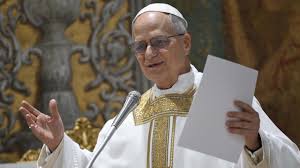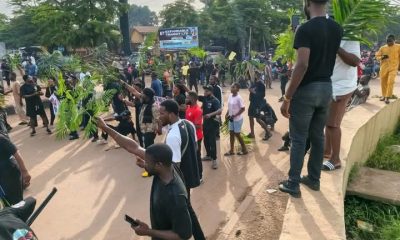Foreign News
Africa Now Battle Ground for Western Power Struggles – CSOs

From Jude Dangwam, Jos
The Country Director of Equity International Initiative (EII) Amb. Chris Iyama has called on the Economic Community Of West Africa States (ECOWAS) to review the regime of sanctions imposed on Niger Republic to promote continuous dialogue and citizens welfare.
He made this call at the end of a one a day Expert Dialogue on International Diplomacy with focus on “Addressing Root Causes of Military Intervention in ECOWAS States” held in Jos Nigeria.
The dialogue put together by the international organization in partnership with C. Y. P. A Africa and Citizens Observers Hub(COH) aimed at proffering best diplomatic ways in resolving the situation in Niger Republic.
The international engagement had participants from other West African countries who expressed concerned that the region and African content is becoming a battlefield for Western Powers struggles.
They described military interventions in African countries as an indictment on the democratic practices which must be addressed to meet the yearning and aspirations of citizens of Member countries of ECOWAS and Africa in general.
“We hereby recommend the review of France colonial policies, review of the 1979 ECOWAS protocol and other trade agreements to leverage socioeconomic cooperation between African States.
“Governments of ECOWAS member states should promote accountability, A proactive fight to combat insecurity, and more effective control of West African porous borders.
“ECOWAS should lead in the advancement of socioeconomic development of West Africa, ECOWAS Commission should instill confidence in the democratic system in West African States by recalibrating its stance on democracy and good governance.”
Amb. Iyam said a robust collaboration between CSOs and the ECOWAS Commission to promote citizen participation, accountability in governance and strengthen democratic institutions as key for the Commission to look into.
“Africans should take ownership of both the African narrative and development path. Elections should be free, fair, transparent and reflect the choices of citizens”
They however insisted that democracy still remains the best form of governance but that it must reflect the aspirations of the citizens, “Diplomacy still remains the best path to addressing the situation in Niger, not Military action as touted by ECOWAS and ensure effective job creation for the citizens.”
They said ECOWAS should promote an independent, corruption-free judiciary in member states and further caution that the implications of a Military action in Niger Republic is in the negative.
“The implication is that there is potential proliferation of insecurity across the sub region. Disruption of existing smooth relationships with neighboring West African countries. Negative socioeconomic implications for Nigeria, humanitarian crisis”.
The CSOs further insisted that effective leadership and transformative political leadership must be seen to be practiced in other member states.
They attributed some of the root causes of the military intervention in Niger Republic to both international and external factors especially across the francophone speaking African countries.
“Economic inequalities and corruption, non-accountability by political office holders, suppression of human rights and dictatorships in democratic governance, insecurity, disenchantment with the democratic process as a result of gaps in the democratic governance structure.
“Erosion of social justice and civil order, underutilization of the youth population, resource curse, citizens discontentment and rising sense of being short-changed by the political leaders in West Africa.
“The negative effects of fake news, violent activities of non-state and state actors, irresponsible local media, influence of local Jihadi groups” are some of the internal factors.
Meanwhile the external factors is alluded to “France neo-colonial policies and entanglement with Francophone West Africa, double standards by the ECOWAS Commission, desire by West African countries to detach from foreign control, the undesirable activities of international conflict merchants, and crafting of the ECOWAS story from outside of West Africa.
“Deteriorating socioeconomic and security situation in Sahel Africa, the fall of Gadaffi opens a floodgate for SALWs, globalization and proliferation of social media fake news, penchant for cynicism and sarcasm, influence of international Jihadi groups, shift in the global power system from a unipolar to multipolar system, use of Africa as a battle ground for Western power struggle” the stakeholders expressed concern.
Foreign News
Israeli-Iran War: Expert Outlines Risks, Upsides for Nigerian Economy

An economist, Dr Muda Yusuf, says the outbreak of war between Israel and Iran portends a combination of risks and upsides for the Nigerian economy, amidst the challenges of an already floundering global economy.Yusuf, Chief Executive Officer, Centre for the Promotion of Private Enterprise (CPPE), made this known on Sunday in Lagos in a statement.
He noted that economies around the world currently grappled with elevated geopolitical tension triggered by the Russian Ukraine war and now the Israel -Hamas conflict. The expert said that energy cost escalation, high interest rate implications and money supply growth were the risks of the conflict.He noted that a major driver of energy prices in Nigeria was the global crude oil price and with the outbreak of the Israeli-Iranian war, crude oil prices surged to 75 dollars per barrel from 65 dollars per barrel a week before.“This is a 15 per cent jump within days and has obvious implications for petroleum product prices globally.“Economies around the world; Nigeria inclusive, would witness a surge in the price of petrol, diesel, jet fuel, gas and related products in the near term.“This would have far reaching implications for many economies and businesses,” he said.Yusuf added that there was a risk of high monetary growth with an increase in revenue from the oil sector.He noted that money supply increased in the Nigerian economy as oil revenue increases because of the monetisation of oil receipts.According to him, this can pose additional inflation risk and exchange rate depreciation risk.The economist noted that this might also provoke tighter monetary policy stance, which could result in difficult credit conditions for businesses.Yusuf, however, said the historically positive correlation between crude oil prices, Gross Domestic Product (GDP) growth, and stock market performance.He said the outlook for the Nigerian stock market was therefore likely to be positive in the current context.As upsides for the Nigerian economy, Yusuf asserted that should the current conflict persisted and escalated, the surge in crude oil price would impact foreign exchange earnings with oil being the biggest earner for the country.“This would even be more impactful if output performance improves.“Crude oil price has surged to $75 per which is about 15 per cent higher than before the outbreak of the Israeli–Iran conflict.“This development would also positively impact the country’s foreign reserves, ensure better foreign exchange liquidity and ultimately the stability of the naira exchange rate,” he said.Yusuf added that the development would also positively impact the country’s revenue as the oil sector currently accounted for about 50 per cent of government revenue.According to him, an improvement in crude oil price would therefore have a significant impact on government revenue.He added that improvement in revenue would positively impact fiscal consolidation and hopefully moderate the growth of the fiscal deficit.“Investments in the oil and gas sector would post better returns if the conflict persists.“High oil price is good news for upstream oil and gas investors,” Yusuf said. (NAN)Foreign News
Trump Tells Iran to Make Nuclear Deal ‘Before it is too Late’

U.S. President Donald Trump has called on Iran to conclude an agreement with Washington on its controversial nuclear programme, amid a series of Israeli strikes on nuclear facilities and military leaders.
“There is still time to make this slaughter come to an end,” Trump wrote on his social media platform Truth Social on Friday.
“Iran must make a deal, before there is nothing left, and save what was once known as the Iranian Empire,” Trump continued.
“JUST DO IT, BEFORE IT IS TOO LATE.”Observers consider it unlikely that Iran’s leadership would opt for a diplomatic approach in light of the Israeli attacks.
Israeli media reported that Tehran had retaliated with an attack involving about 100 drones, all of which were shot down.
“I gave Iran chance after chance to make a deal,” Trump wrote.
“The U.S. makes the best and most lethal military equipment anywhere in the World, BY FAR, and Israel has a lot of it, with much more to come and they know how to use it,” Trump wrote. (dpa/NAN)
Foreign News
Pope Leo Prays for Victims of Austrian School Shooting

Pope Leo XIV said on Wednesday that he was praying for the victims of the mass shooting in a school in the Austrian city of Graz.
“I would like to express my prayers for the victims of the tragedy at the Graz school,” Leo said during his weekly audience in the Vatican.
Leo added that he is keeping the families, teachers, and fellow pupils in his thoughts.
According to police, a 21-year-old former pupil at the school entered the grounds on Tuesday and opened fire, killing 10 pupils aged between 15 and 17 as well as a teacher.
He then shot himself.
Eleven people remain in the hospital, most of them in intensive care.
All are now reported to be in a stable condition.
Graz, in south-eastern Austria, is home to around 300,000 people. (dpa/NAN)




















